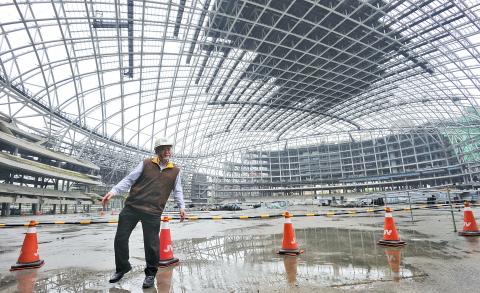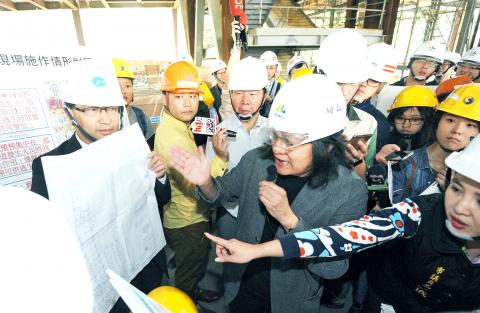A survey of the Taipei Dome construction site, made jointly by the Taipei Department of Urban Development, Farglory Group and city councilors, ended in mutual recriminations yesterday, with Farglory reiterating its desire to resume building the dome and the city government again rejecting the proposal, in spite of a consensus on April 14 to dissolve the contract.
Held to investigate reports of steel erosion and purported attenuation of the dome’s foundations by “upward buoyant forces,” the survey produced separate and contradicting statements from city officials, Farglory representatives and city councilors, which were followed by heated public statements later in the day.
Taipei Department of Urban Development Commissioner Lin Jou-min (林洲民) said in his press briefing that Farglory had made the stadium complex unsafe by altering the original blueprints without seeking city approval, including the removal of 17 staircases.

Photo: Liu Hsin-de, Taipei Times
The city government’s previous evaluations were sanctioned by the central government and conducted with the full participation of the Taiwan Architecture and Building Center, he said, adding that Farglory had violated the law by secretly making changes to the original design over a period of 50 months without informing regulators of those changes.
However, in its separate press briefing, Farglory general manager Tang Chia-feng (湯佳峰) categorically denied any wrongdoing, saying: “Each detail of the dome had been done in accordance with the law and the contract without a single iota of error, and the Taipei City Government’s claims are without any merit whatsoever.”
Farglory only consented to dissolve the contract to build the dome because it wishes to cooperate with the government, and its preference was and still is to restore the contract “as soon as possible,” Tang said.

Photo: Liu Hsin-de, Taipei Times
He added that in Farglory’s view, the city government’s allegations of public safety violations are “manufactured issues.”
Farglory maintains that it had legally obtained permission to change the design when it applied for relicensing in 2013, Tang said.
After participating in the survey, Democratic Progressive Party City Councilor Tang Chung-yen (童仲彥) told reporters that the unfinished stadium is “a big rotten egg,” and that both the city government and Farglory were to blame.
Although Farglory has an ongoing obligation to safeguard public safety at the Taipei Dome construction area, the developer removed instruments for measuring water pressure from the site as soon as the city government announced its decision to suspend work on the dome, Tang said.
The Department of Urban Development was apparently unaware of this maneuver, because it had recently assured the public that there is nothing wrong with the site by using outdated buoyancy figures from measurements made in July last year, Tang said.
“The Taipei City Government and the Farglory Group deserve 50 strokes of the cane each,” he said.
Taipei City Government spokesman Sidney Lin (林鶴明) said it was Farglory that was “manufacturing issues,” and unless Farglory resolves its unauthorized design changes, Taipei would not consider restoring the contract.
“Farglory’s attempt to mislead public opinion is irresponsible and impractical,” Lin said.
Additional reporting by CNA

Chinese Nationalist Party (KMT) Chairman Eric Chu (朱立倫), spokeswoman Yang Chih-yu (楊智伃) and Legislator Hsieh Lung-chieh (謝龍介) would be summoned by police for questioning for leading an illegal assembly on Thursday evening last week, Minister of the Interior Liu Shyh-fang (劉世芳) said today. The three KMT officials led an assembly outside the Taipei City Prosecutors’ Office, a restricted area where public assembly is not allowed, protesting the questioning of several KMT staff and searches of KMT headquarters and offices in a recall petition forgery case. Chu, Yang and Hsieh are all suspected of contravening the Assembly and Parade Act (集會遊行法) by holding

PRAISE: Japanese visitor Takashi Kubota said the Taiwanese temple architecture images showcased in the AI Art Gallery were the most impressive displays he saw Taiwan does not have an official pavilion at the World Expo in Osaka, Japan, because of its diplomatic predicament, but the government-backed Tech World pavilion is drawing interest with its unique recreations of works by Taiwanese artists. The pavilion features an artificial intelligence (AI)-based art gallery showcasing works of famous Taiwanese artists from the Japanese colonial period using innovative technologies. Among its main simulated displays are Eastern gouache paintings by Chen Chin (陳進), Lin Yu-shan (林玉山) and Kuo Hsueh-hu (郭雪湖), who were the three young Taiwanese painters selected for the East Asian Painting exhibition in 1927. Gouache is a water-based

Taiwan would welcome the return of Honduras as a diplomatic ally if its next president decides to make such a move, Minister of Foreign Affairs Lin Chia-lung (林佳龍) said yesterday. “Of course, we would welcome Honduras if they want to restore diplomatic ties with Taiwan after their elections,” Lin said at a meeting of the legislature’s Foreign Affairs and National Defense Committee, when asked to comment on statements made by two of the three Honduran presidential candidates during the presidential campaign in the Central American country. Taiwan is paying close attention to the region as a whole in the wake of a

OFF-TARGET: More than 30,000 participants were expected to take part in the Games next month, but only 6,550 foreign and 19,400 Taiwanese athletes have registered Taipei city councilors yesterday blasted the organizers of next month’s World Masters Games over sudden timetable and venue changes, which they said have caused thousands of participants to back out of the international sporting event, among other organizational issues. They also cited visa delays and political interference by China as reasons many foreign athletes are requesting refunds for the event, to be held from May 17 to 30. Jointly organized by the Taipei and New Taipei City governments, the games have been rocked by numerous controversies since preparations began in 2020. Taipei City Councilor Lin Yen-feng (林延鳳) said yesterday that new measures by